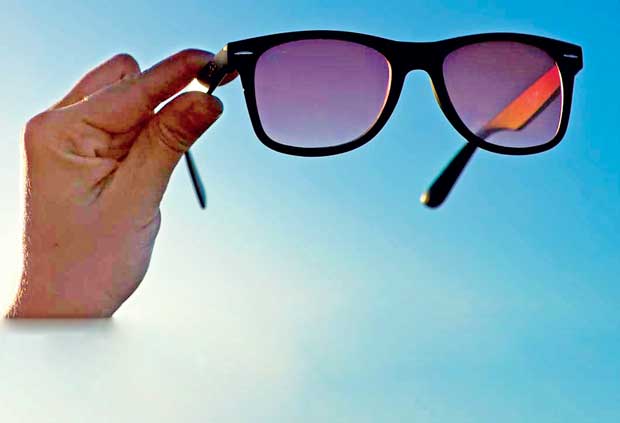24 May 2017 - {{hitsCtrl.values.hits}}

 Our tiny island sitting amidst the Indian Ocean receives strong sunlight all year round and we have had an extra blast of sunlight in the past few months. The human eye, our most treasured asset to vision, in particular is being subjected to harsh damage from the sun. Doctors strongly recommend the usage of sunglasses to minimize the adverse effects on the eye, so no matter what activities you are engaged in, your eyes will be protected and in good health.
Our tiny island sitting amidst the Indian Ocean receives strong sunlight all year round and we have had an extra blast of sunlight in the past few months. The human eye, our most treasured asset to vision, in particular is being subjected to harsh damage from the sun. Doctors strongly recommend the usage of sunglasses to minimize the adverse effects on the eye, so no matter what activities you are engaged in, your eyes will be protected and in good health.
We spoke to retired Consultant Eye Surgeon from the Ragama Teaching Hospital Dr. M. Wijetunge regarding the need to wear sunglasses, which type of sunglasses are most suitable for our islanders and last but not least, the good and bad sides of sunglasses.
Visible light waves from the sun travel in all directions. When this scattered light meets a horizontal surface (like a road or water), a large portion of light is reflected with horizontal polarization. This is seen as a white glare by the eye and masks the light useful to the human eye and reduces visibility, depth perception, color perception and may temporarily blind you while at the same time causing discomfort to the eye. The glare may also be difficult to look at. The UV light from the sun also harms the eye in ways we do not realize. It may result in cataracts, dry eyes and eye irritability, retina degeneration and building up of extra tissue on the cornea of the eye, which is known as pterigium. Dr. Wijetunge recommends sunglasses to avoid these eye complications. “When the naked eye looks at a light source, part of the light rays is reflected and this reduces damage to the light sensing part of the eye, the retina. Wearing sunglasses further reflects 10-20% of the light rays providing more protection to the retina and thereby our eyesight.”
 According to Dr. Wijetunge, reducing glare and improving eye safety is the overall function of sunglasses. “They reduce eye strain caused by squinting to see better under the sun which results in discomfort and eye health issues such as redness, irritation, fatigue, and headaches. Sunglasses maintain eye comfort and keep the eye well rested.” Sunglasses also prove useful in water-related activities such as water sports, fishing and boating. The water’s surface reflects everything, obscuring the view of the water. “The majority of fishermen in our country suffer from eye cataracts as the glare caused by the reflected light of water is responsible for this. Our fishermen do not use sunglasses. I recommend sunglasses with glare filters. “Using sunglasses, especially polarized eye wear, blocks reflection and enables the wearer to see the water with more lucidity and reduces risks of cataracts.”
According to Dr. Wijetunge, reducing glare and improving eye safety is the overall function of sunglasses. “They reduce eye strain caused by squinting to see better under the sun which results in discomfort and eye health issues such as redness, irritation, fatigue, and headaches. Sunglasses maintain eye comfort and keep the eye well rested.” Sunglasses also prove useful in water-related activities such as water sports, fishing and boating. The water’s surface reflects everything, obscuring the view of the water. “The majority of fishermen in our country suffer from eye cataracts as the glare caused by the reflected light of water is responsible for this. Our fishermen do not use sunglasses. I recommend sunglasses with glare filters. “Using sunglasses, especially polarized eye wear, blocks reflection and enables the wearer to see the water with more lucidity and reduces risks of cataracts.”
“As far as I am concerned, sunglasses do more good than harm but the wrong kind of sunglassescould lead to a reversed situation. People opt for cheap types of sunglasses where they do not take the quality into consideration,” commented Dr. Wijetunge. A variety of shades are available for purchase and though you may be spoilt for choice and at a loss about the right kind of shades for you, it is of utmost importance to understand that as trivial as it may seem, the tables can turn if the wrong kind of sunglasses are worn. Some sunglasses darken the vision which could lead to reduced eyesight. Some sunglasses harness materials which allow UV light to go through beyond the limit. “Side-effects of the wrong kind of sunglasses are experienced if a person wears them on a long term basis. Headaches, tearing and discomfort are some of the side-effects. It is always advisable to use standardized sunglasses” he said. Dr. Wijetunge further added that wearing larger sunglasses are practically advised, as opposed to wearing smaller ones. “Larger shades cover the entire area of the eye but when smaller shades are worn, UV rays enter the eye through the open areas and cause dilation of the pupil continuously. This is not harmful to the eyes.”
Buying sunglasses is not as easy as it sounds and there are many aspects that must be taken into consideration. Never let expense be your deciding factor in choosing the right kind of shades. Priority must be given to quality because you do not want to make the wrong decision when it comes to vision.
24 Dec 2024 32 minute ago
24 Dec 2024 2 hours ago
24 Dec 2024 3 hours ago
24 Dec 2024 4 hours ago
24 Dec 2024 5 hours ago